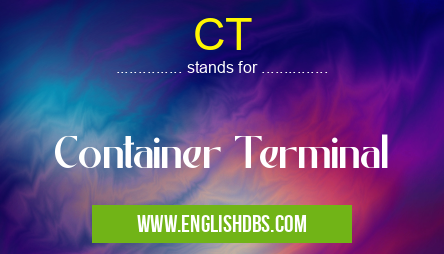What does CT mean in LOGISTICS
Container Terminal (CT) is an area where the handling and storage of containers taking place. CTs are usually found at ports and major transport hubs, handling containerized cargo which is loaded or unloaded from ships, trucks, and rail wagons. Container terminals can handle a great variety of products due to their flexibility in loading and unloading capacity. They serve as a critical link in the supply chain for businesses transporting goods around the world, providing secure storage for containers during transit. They help move goods quickly and efficiently so that businesses can meet their customers’ demands on time.

CT meaning in Logistics in Business
CT mostly used in an acronym Logistics in Category Business that means Container Terminal
Shorthand: CT,
Full Form: Container Terminal
For more information of "Container Terminal", see the section below.
What Does CT Stand For?
The acronym “CT” stands for Container Terminal. A container terminal is an area where containers are handled and stored used for storing containerized freight between shipping companies and transportation vehicles such as truckers or rails. It is responsible for unloading incoming containers, loading outgoing containers, stacking them in designated areas according to customer requirements and company guidelines, ensuring security of cargo while it is in transit through the facility, managing inventory of containers within the facility’s control systems, maintaining accurate records related to freight arrivals/departures/loadings etc., provide maintenance services such as cleaning or repairing equipment related to container operations etc., provide administrative services such as billing customers etc., manage overall safety procedures within its premises etc.
What Is The Meaning Of CT In Business?
In business, the abbreviation “CT” stands for Container Terminal which refers to an area used by shipping companies to handle and store containers filled with commercial goods before they are loaded onto trucks or other transportation vehicles like rail wagons. It also helps secure these goods during transit by maintaining appropriate records. As part of their responsibilities, Container Terminals also provide repair/maintenance services along with administrative duties like billing customers which are essential components of any successful supply chain management system.
Essential Questions and Answers on Container Terminal in "BUSINESS»LOGISTICS"
What is a Container Terminal?
A container terminal is a facility for the storage and transportation of shipping containers. It typically includes docks, warehouses, cranes, and other infrastructure necessary to receive, transport and store containers.
What are the benefits of using Container Terminals?
Container terminals offer a number of benefits over conventional shipping. They allow for faster and more efficient shipment of goods; they provide increased storage capacity; they can be used to quickly transport large quantities of cargo; and they provide secure storage options.
How does the process work at a Container Terminal?
The typical process when utilizing a container terminal involves loading containers onto ships, unloading them at their destination port, transferring them between trucks or railcars and container handling equipment such as gantry cranes or straddle carriers.
What types of services are offered at a Container Terminal?
Services offered at a container terminal may include freight forwarding, customs clearance, ship charters, cargo handling/inspection services and stevedoring (unloading).
How long does it take to transfer goods via Container Terminal?
The time taken for goods to be transferred through a container terminal will depend on several factors including the route being taken, distance traveled, vessel speed and schedule adherence. Generally speaking timescales could vary from 1 day up to 45 days depending upon the situation.
Are there any restrictions on what can be shipped via Container Terminal?
There are certain restrictions that apply in regards to which items can be transported via container terminal - these will vary depending on which country you are located in as well as where your final destination is located. Generally speaking most items which comply with international trade regulations should be allowed through a container terminal however this should always be checked ahead of time.
Is it possible to track items while in transit through the Container Terminal?
Yes it is possible - many modern container terminals feature tracking technology which allows you to monitor the location and status of your cargo throughout the entire transit process. This information can often be accessed online or through mobile applications so that you can stay up-to-date with your shipments every step of the way.
Are there any security measures in place at a Container Terminal?
Yes - modern container terminals have stringent security measures designed to ensure that all cargo is safe during its journey across borders or oceans. This usually includes CCTV systems, security guards, access control systems as well as physical barriers such as gates or fences around the dock area itself.
Can hazardous materials be shipped via Container Terminals?
In some cases yes – however this also depends on which country you are located in as well as where your final destination is located due to different regulations regarding hazardous materials across regions/countries. It’s important that you check whether these items are allowed before attempting shipment via container terminal.
Final Words:
Container Terminal (CT), as an abbreviation has come to represent one of the most integral parts in global commerce – providing reliable storage facilities with timely pick-up and delivery options for businesses transporting cargo across international borders on a daily basis. From providing repair services to ensure safe journeys for merchandise to accommodating different types of freight depending on customer needs; container terminals have become indispensable in contemporary times. With its ability to help move goods quickly without compromising on quality even during peak shipment periods; CTs have proven themselves a critical asset for many industries today.
CT also stands for: |
|
| All stands for CT |
